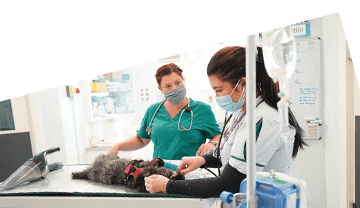
Pet Dental Awareness Month
February 2, 2022
February is #dentalawareness month here at Rowan. It’s important to keep on top of your pet’s dental health and different pets have different needs. Stay tuned to find out how you can take care of your pet’s teeth to keep them health and pain free.
Doggy dental care; what’s normal for your pet?
Gum disease can lead to bad breath, pain and loose teeth. Infections can spread to the heart, liver, kidney or lungs – so it’s worth knowing what to look out for to catch it early.
You should get your dog used to having their mouth touched from a young age. It makes it so much easier for you and the vets when they need to have their mouths examined or their teeth cleaned. You’ll also get to know what is normal for your dog’s mouth and teeth too which helps to pick up on any issues more quickly!
At Rowan we do a full health check as part of your dog’s annual booster visit. This includes taking a look at your dog’s teeth. The vet can give you some really great advice and tips on how to care for your dog’s teeth to keep them in tip-top condition, but you should also check your dog’s teeth every few weeks too. It helps to pick up issues early and a year is a long time to have toothache!
What’s your dog’s dental regime?
If you’ve never checked your dog’s teeth before, or you don’t know the signs of gum disease, here’s a few pointers to look out for:
- Bad breath – never assume this is normal
- Gums that are painful, red, swollen or bleed easily
- Plaque – this appears as a build-up of yellow material on the teeth
- Tartar – a hard, brown build-up on the teeth
- Loose or missing teeth
Mouth pain may not be obvious but may show as:
- Decreased appetite
- Difficulty eating
- Bleeding when eating
- Irritability
- Reluctance to be handled around the mouth
- Depression or being quieter than normal
If you’re in any doubt, just give us a call and make an appointment – one of our RVNs will be happy to show you what you are looking for and how to examine your dog’s teeth without risking being bitten.
Preventing plaque
As an owner, you can take steps to prevent the build-up of plaque on your dog’s teeth and there are several ways you can do this:
- Brush your dog’s teeth regularly with a dog-safe toothpaste.
- Give your dog chew toys.
- Feed dry dog food or a specialised dental diet.
- Visit your vet for regular dental check ups.
Download our DOGGY DENTAL advice sheet for more information and a step by step guide on how to brush your dog’s teeth.
If you need advice on techniques or products, contact the team via PetsApp or by phone on 01772 639800 OR 01253 766352.
#rowanvets #vetsinpreston #vetsinblackpool #vetsinlytham #vetsinkirkham #vetsinwarton #vetsinfreckelton #photooftheday #instagood #nofilter #picoftheday #love #healthypets #goldstandardpetcare #pethealthplan #petdentalhealth #welovedogs #welovecats #weloverabbits #pethealth





